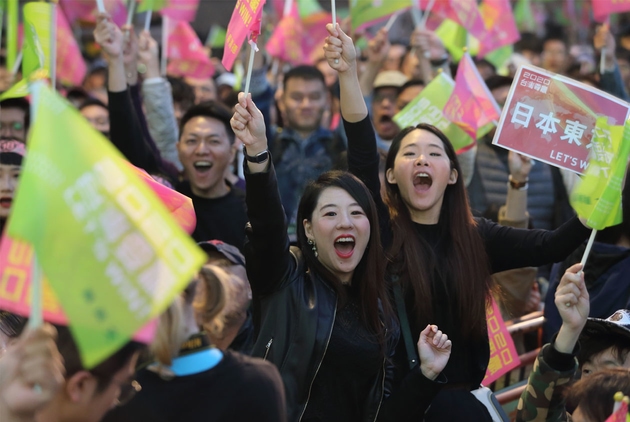Opinion
Nojima Tsuyoshi: Taiwanese Youth Vote for Change

Source:Chien-Tong Wang
Famed Japanese journalist and writer Nojima Tsuyoshi was recently asked by a young Japanese celebrity: “Why do young voters in Taiwan care so much about the elections?” Nojima was halfway into his reply before he realized, “Why am I, a Japanese, criticizing Japan?” It was incredible, but it was also the undeniable truth.
Views
Nojima Tsuyoshi: Taiwanese Youth Vote for Change
By Nojima Tsuyoshiweb only
On the evening of Jan. 11th, I was a guest on a special election day program on Public Television Service Taiwan (台灣公視). The day before, I had mailed my prediction of the results to the producer at PTS. My forecast was as follows: for president, Tsai Ing-wen will get 55-60%, Han Kuo-yu will get 35-40%, and James Soong will get 5-10% of the votes. In the legislative elections, the DPP will secure 55-60 seats; the KMT will secure 40-45 seats; the Taiwan People’s Party will secure 3-5 seats; the New Power Party, the People First Party, and the Taiwan Statebuilding Party will get one or two seats between them; and independents will get 3-5 seats.
I think my predictions pretty much matched the results of both the presidential and legislative elections. Generally speaking, in the lead-up to a Taiwanese election, candidates who’re polling behind their opponents like to claim they are “catching up quickly”, while candidates polling ahead will try to generate a sense of urgency by saying they are “losing their lead”. These statements are beneficial for all parties involved. That’s why many voters will believe “the race is tighter than we thought” during the last week before the election. But the truth is, Taiwanese elections are usually determined a month or so before voting day. Almost nobody has ever won with a “Hail Mary” rally during the final week before the ballot boxes open.
To succinctly summarize what happened in this year’s election, it was Hong Kong that saved Tsai and the DPP. What’s happening in Hong Kong has a deep impact on Taiwanese politics. This serendipitous chance was made possible by Chinese president Xi Jinping’s recent speeches about “one country, two systems”. In other words, Xi did a huge favor for Tsai. The rivalry between China and the United States has worn down his patience; the KMT’s stunning victory in the “nine-in-one” elections of 2018 was seen as a golden opportunity. In this sense, we can also say it was America that saved Tsai. The KMT would not have lost so many votes if it weren’t for the turmoil in Hong Kong. Outside factors were very advantageous for the DPP during this election. We may go so far as to say it was only natural for the DPP to claim victory.
 Photo by Justin Wu/CW
Photo by Justin Wu/CW
Incumbent president and DPP candidate Tsai won a record-shattering 8.17 million votes. More importantly, voter turnout was 74.9%, higher than the records set in 2012 and 2016. To Japan and the global community in general, this was unimaginably astonishing.
For this election, many Japanese journalists and citizens came to Taiwan to observe the proceedings. Flights from Japan to Taiwan were fully booked. Many passengers were Taiwanese nationals coming home to vote, but there were also Japanese nationals who were interested in Taiwan’s election. I saw Japanese people I know at various rallies. The Japanese like more than Taiwan’s delicious xiaolongbao; they also like the elections.
Why do the Japanese like Taiwanese elections? Because Taiwan still has the fervor for democracy and elections that Japan has lost.
Last week, I also spoke about Taiwan’s elections in various political talk shows on Japanese TV. I spoke to young Japanese celebrities in one program. When I talked about Taiwanese voters, they were more amazed by Taiwanese youth’s passion for voting than how the situation in Hong Kong is affecting the elections or how Chinese pressure on Taiwan is steadily mounting.
 Photo by Chien-Tong Wang/CW
Photo by Chien-Tong Wang/CW
They asked me: “Why do young people in Taiwan care so much about the elections?”
I replied, “The Taiwanese believe an important way of effecting social change is through politics and elections. By contrast, young people in Japan seem to believe the easier way to change society is by anonymously complaining and criticizing on the internet. So, Japanese youths don’t vote. They believe whether or not they get involved in elections or politics, nothing will be changed, and so there’s no reason to go vote.”
This was my response to their question. Halfway into my reply, I was astounded to discover I was criticizing Japan, even though I’m a citizen of Japan. It was incredible, but it was also the undeniable truth.
Voter turnout in the 2017 Japanese general election was a depressing 53%. It was the second lowest turnout in post-war Japan. If we break it down by age groups, the problem becomes apparent. Turnout for voters age 20 to 29 was 30%. Turnout was 40% for voters in their thirties, 50% for voters in their forties, 60% for voters in their fifties, and 70% for those in their sixties. The older you are, the more interested you are in politics. But the younger generation is generally apathetic toward the whole process.
In this year’s Taiwanese elections, I heard the youth vote was the major reason why Tsai won a landslide victory. Voter turnout for young people should not be lower than middle-age or senior voters. But it’s a tough task for any political party to draw out the youth vote. President Tsai probably allowed herself to be interviewed by popular YouTuber Potter King for this exact reason.
It’s been my personal experience that Taiwan differs greatly from Japan in this way. Last year, Taiwan’s famous Eslite Bookstore opened its first non-Chinese branch in Tokyo’s Nihonbashi business district. As usual, Eslite hosted various seminars, which are part of Eslite’s brand-building campaigns. It’s one of the reasons their brand expanded so rapidly. The founder’s vision is ingrained in these seminars.
It was a great idea to bring this tradition over to Japan. I’ve attended as a guest of honor at four such seminars in Nihonbashi. There are plenty of people in attendance, but every time I’m there, I’m struck by the difference between the two nations. There are so few youngsters in attendance. My feeling is, less than 20% of the audience are younger than thirty. Nearly half are over sixty. Even for a “super-aging” society, this ratio is enough to raise eyebrows.
This problem is not limited to the Eslite branch in Nihonbashi. Many seminars about social and international problems in Japan are attended by lots of senior citizens and a scant few younger participants.
On the other hand, I often host speeches and promotional events in Taiwan. Usually, there’s a high ratio of young people. My impression is 70-80% are under thirty. This is exactly the opposite of Japan.
It is the same for elections. Young Taiwanese are very politically active. There are many young candidates and female candidates. The New Power Party and the Taiwan Statebuilding Party are both political parties centered around young people. There are also plenty of young people in attendance at political rallies, whereas such events are usually endorsed by middle-aged men in Japan.
I’ve never heard of first-time voters in Taiwan having a lower turnout rate than other age groups. I often see young people enthusiastically discussing social problems. I’m sure they believe “elections and politics can change society”. That’s why they pitch in. This reflects their “faith” in the democratic process.
In contrast, this “faith” is almost nonexistent in Japan. Many youngsters don’t believe elections and politics are the way to improve society for the better.
I also teach university courses. I often ask my students, “Why are young people in Taiwan and Hong Kong so invested in politics, but you are not?” The class falls silent once the words are out of my mouth. They don’t say it out loud, but I know their minds are filled with apathetic thoughts, such as “even if I vote, nothing will change”.
They think this way because we as adults have failed them. We cannot blame them too much. But, what can we do? I don’t have the answer. What I can say is, there are examples of countries where citizens change their society through politics and elections. Taiwan is one example. Hong Kong is another.
After winning the elections, the DPP has legalized same-sex marriage and terminated the nuclear power program. Cross-strait tensions have also cooled off a bit. As for Hong Kong, if it weren’t for the DPP, Hongkongers wouldn’t have been able to come to Taiwan to seek “refuge” during the recent protests.
When the KMT won in 2008, cross-strait relations took a drastic turn for the better. There were more Chinese tourists. Whether it’s the DPP or KMT that wins, Taiwanese society has always changed as a result. It is for this reason that the youth in Taiwan feel a sense of urgency and have a reason to hope. Their passion for politics stems from this background.
Across the sea, many Japanese secretly think nothing will change no matter who they elect. Whether the LDP or DPFP comes into power, the economy will remain stagnant, so no effort is made to dethrone unworthy rulers. Whoever is in charge, the job market will be just as difficult, the pension service will still go bankrupt, and women’s social participation will be just as lackluster. No wonder all the grownups’ admonitions to go vote sound like a dishonest hustle.
Of course, Taiwan has its own unresolved problems. The results of the elections are a triumph for some, heartbreak for others. Regardless, it was free of Chinese influence. Twenty-three million Taiwanese people decided their own fate. To us foreigners residing in Taiwan, the fair and just election process is even more admirable than the result.
We especially respect the fact that young Taiwanese believe their votes can change society, and their society has been able to instill this democratic value in so many of them. Japan envies the Taiwanese and wishes it could emulate them.
On my flight to Taiwan on the morning of January 11th, I met many young Taiwanese citizens returning home to vote. Even if they were working abroad and had to scrounge up the cash to fly, they splurged on an expensive plane ticket to determine the course of their country. That the Taiwanese society was able to produce so many passionate and politically active youngsters may be the island nation’s greatest strength. It’s also the reason why foreigners like myself support Taiwan’s cause. China may raise an outcry about how Taiwan should be reunified with the Mainland, but it lacks the very values and freedom that make Taiwan worth rooting for.
【More from Nojima Tsuyoshi Column】
♦ Taiwanese Drivers Turn Streets into Warzone
♦ Japanese High Schools Crazy about Educational Tours to Taiwan
♦ No International Recognition, No State?
♦ Circle Taiwan With a Bike – A New Trend for Japanese
Translated by Jack C.
Edited by Sharon Tseng












